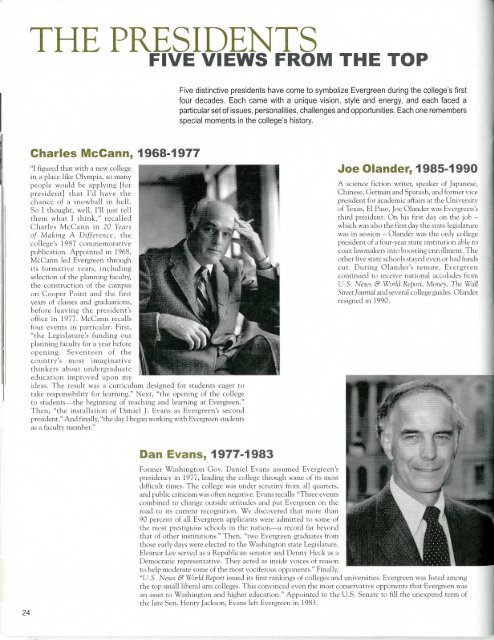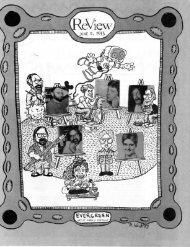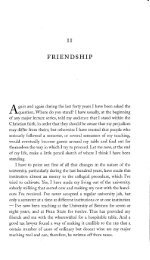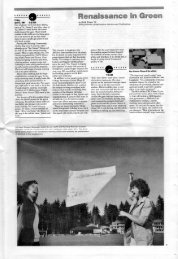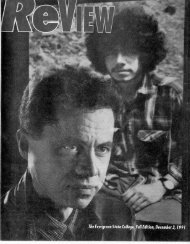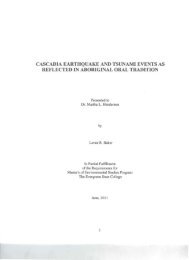V23 #2 Spring 2002 - Archives - The Evergreen State College
V23 #2 Spring 2002 - Archives - The Evergreen State College
V23 #2 Spring 2002 - Archives - The Evergreen State College
You also want an ePaper? Increase the reach of your titles
YUMPU automatically turns print PDFs into web optimized ePapers that Google loves.
24<br />
THE PRESIDENTS<br />
Charles McCann,<br />
"I figured that with a new college 11| || | •._ ^jjgiy.<br />
in a place like Olympia, so many<br />
people would be applying [for<br />
president] that I'd have the<br />
chance of a snowball in hell.<br />
So I thought, well, I'll just tell<br />
them what I think," recalled<br />
Charles McCann in 20 Years<br />
of Making A. Difference, the<br />
college's 1987 commemorative<br />
publication. Appointed in 1968,<br />
McCann led <strong>Evergreen</strong> through<br />
its formative years, including<br />
selection of the planning faculty,<br />
the construction of the campus<br />
on Cooper Point and the first<br />
years of classes and graduations,<br />
before leaving the president's<br />
office in 1977. McCann recalls<br />
four events in particular: First,<br />
"the Legislature's funding our<br />
planning faculty for a year before<br />
opening. Seventeen of the<br />
country's most imaginative<br />
thinkers about undergraduate<br />
education improved upon my<br />
ideas. <strong>The</strong> result was a curriculum designed for students eager to<br />
take responsibility for learning." Next, "the opening of the college<br />
to students—the beginning of teaching and learning at <strong>Evergreen</strong>."<br />
<strong>The</strong>n, "the installation of Daniel J. Evans as <strong>Evergreen</strong>'s second<br />
president." And finally, "the day I began working with <strong>Evergreen</strong> students<br />
as a facultv member."<br />
Dan Evans,<br />
Five distinctive presidents have come to symbolize <strong>Evergreen</strong> during the college's first<br />
four decades. Each came with a unique vision, style and energy, and each faced a<br />
particular set of issues, personalities, challenges and opportunities. Each one remembers<br />
special moments in the college's history.<br />
1<br />
Joe Olander, 1985-1<br />
A science fiction writer, speaker of Japanese,<br />
Chinese, German and Spanish, and former vice<br />
president for academic affairs at the University<br />
of Texas, El Paso, Joe Olander was <strong>Evergreen</strong>'s<br />
third president. On his first day on the job —<br />
which was also the first day the state legislature<br />
was in session - Olander was the only college<br />
president of a four-year state institution able to<br />
coax lawmakers into boosting enrollment. <strong>The</strong><br />
other five state schools stayed even or had funds<br />
cut. During dander's tenure, <strong>Evergreen</strong><br />
continued to receive national accolades from<br />
U.S. News & World Report, Money, <strong>The</strong> Wall<br />
Street Journal and several college guides. Olander<br />
resigned in 1990.<br />
Former Washington Gov. Daniel Evans assumed <strong>Evergreen</strong>'s<br />
presidency in 1977, leading the college through some of its most<br />
difficult times. <strong>The</strong> college was under scrutiny from all quarters,<br />
and public criticism was often negative. Evans recalls: "Three events<br />
combined to change outside attitudes and put <strong>Evergreen</strong> on the<br />
road to its current recognition. We discovered that more than<br />
90 percent of all <strong>Evergreen</strong> applicants were admitted to some of<br />
the most prestigious schools in the nation—a record far beyond<br />
that of other institutions." <strong>The</strong>n, "two <strong>Evergreen</strong> graduates from<br />
those early days were elected to the Washington state Legislature.<br />
Eleanor Lee served as a Republican senator and Denny Heck as a<br />
Democratic representative. <strong>The</strong>y acted as inside voices of reason<br />
to help moderate some of the most vociferous opponents." Finally,<br />
"U.S. News & World Report issued its first rankings of colleges and universities. <strong>Evergreen</strong> was listed among<br />
the top small liberal arts colleges. This convinced even the most conservative opponents that <strong>Evergreen</strong> was<br />
an asset to Washington and higher education." Appointed to the U.S. Senate to fill the unexpired term of<br />
the late Sen. Henry Jackson, Evans left <strong>Evergreen</strong> in 1983.<br />
Les Puree,<br />
Jane Jervis,<br />
Les Puree was named president in 2000. While <strong>Evergreen</strong><br />
is even more firmly established as an innovative educational<br />
leader, budget challenges have become a significant issue.<br />
"In many ways, the college in <strong>2002</strong> is the same college<br />
that the pioneering class of 1972 knew. <strong>Evergreen</strong>'s<br />
faculty and staff remain extraordinarily dedicated to<br />
teaching. <strong>The</strong> college remains committed to<br />
academically rigorous, student-centered, interdisciplinary<br />
education with an emphasis on public service.<br />
At the same time, much has changed. <strong>Evergreen</strong> alumni<br />
work in our community, across the country and around the<br />
world-. Thirty years ago, <strong>Evergreen</strong> might have been<br />
dismissed as an eccentric and (probably short-lived)<br />
experimental college. Today, it is widely recognized that,<br />
if we have sometimes seemed eccentric, it is because we<br />
have been in the vanguard of higher education reform.<br />
Programs that were once dismissed as experimental are<br />
now embraced as innovative. Today, <strong>Evergreen</strong> is<br />
a recognized leader in shaping the future of teaching and<br />
learning nationally."<br />
Jane Jervis, who assumed the presidency in 1992,<br />
found an institution that was different from its<br />
early days. "[One] that thought it was plenty big<br />
enough, maybe too big; that saw itself as<br />
an unappreciated educational treasure, not as a<br />
public resource; that would really prefer to be<br />
a private college with very low tuition, so that it<br />
could be elite but democratic at the same time;<br />
and that deeply resented claims by the state<br />
that it should be responsive to enrollment<br />
and workforce demands. <strong>The</strong>re was deep<br />
ambivalence about graduate and outreach<br />
programs. Some of those things are still true, but<br />
we managed to embrace structured growth,<br />
embrace and build the Tacoma and reservationbased<br />
programs, build and support our public<br />
service centers, build alliances with community<br />
colleges, begin to reform the curriculum and<br />
begin to turn our face outward to the community,<br />
the state and the nation."<br />
Two capital construction efforts also illustrate<br />
changes that occurred during Jervis'<br />
administration. "<strong>The</strong> Longhouse. We put this 20year<br />
dream at the top of our institutional budget<br />
request, ahead of leaky roofs and earthquake<br />
preparedness. We then lobbied hard, and,<br />
astonishingly, got it funded. <strong>The</strong> Longhouse symbolized bringing people together, especially people<br />
of color, and its perpetual deferral symbolized their marginalization. Building the Longhouse was<br />
a powerful affirmation of community and an act of healing." <strong>The</strong> other is "Seminar II.<br />
Now under construction, the planning we did was a result of the college's growth and turning<br />
outward." Jane Jervis retired from <strong>Evergreen</strong> in 2000.<br />
Despite securing funding from the Legislature for Seminar<br />
II and its subsequent construction now under way, and a<br />
new building for the Tacoma program, <strong>Evergreen</strong> will<br />
undoubtedly face fiscal challenges in the years ahead. "Public colleges nationally will continue to see a<br />
decline in public funding. With the growing financial support of our alumni, the dedication of our faculty<br />
and staff, and the commitment and support of our students and their families, <strong>Evergreen</strong> is sure to enjoy<br />
continued success for many years to come."<br />
25


